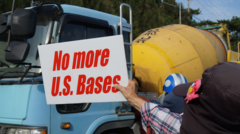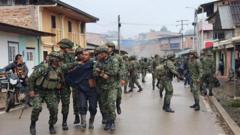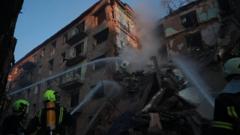As protests rage across Kenya, the death toll has risen to 16, highlighting ongoing public anger against corruption and police violence. Thousands participated in demonstrations, facing brutal police responses.
Protests in Kenya Escalate Amid Rising Death Toll

Protests in Kenya Escalate Amid Rising Death Toll
Nationwide demonstrations against government corruption and police brutality lead to a tragic increase in fatalities.
In the wake of widespread protests on Wednesday, the death toll in Kenya has tragically risen to 16, a leading human rights group has reported. Demonstrators took to the streets nationwide, voicing their outrage over government corruption and police brutality, many accompanying their chants with Kenyan flags and calls for President William Ruto to resign.
The protests turned violent as clashes erupted between thousands of demonstrators and heavily armed police who responded with live ammunition, rubber bullets, and tear gas. Irũngũ Houghton, executive director of Amnesty Kenya, confirmed the rise in fatalities, noting that the majority of the deceased suffered from gunshot wounds. Among the victims was Fred Wamale Wanyonyi, a security guard killed near the Kenya Power headquarters.
Reports indicate that over 400 individuals sustained injuries during the unrest, with more than 80 suffering serious wounds, as stated by a coalition of human rights groups. So far, the Kenya National Police have not replied to requests for comments on the situation.
Destructive scenes were visible throughout Nairobi on Thursday, where stones and debris covered the streets. Many businesses that had closed due to the protests cautiously reopened, while locals described a pervasive fear of government reprisals as they navigated the aftermath.
Local media also reported that police stations had been set on fire and shops looted across various regions. The protests have occurred in approximately half of Kenya's 47 counties, with at least 61 arrests noted by the Independent Police Oversight Authority in their preliminary assessment released Wednesday evening.
The government imposed significant restrictions on media coverage, blocking television and radio stations from live reporting, a move sharply criticized by media organizations and rights groups. Additionally, internet watchdog group NetBlocks reported that access to the messaging app Telegram was limited. A subsequent legal petition led to a suspension of the media blackout.
The unrest marked an anniversary of last year's protests, which led to over 60 fatalities and numerous cases of abduction and torture following demonstrations sparked by a contentious tax increase bill. Despite police assurances that they do not target protestors, anger over economic struggles, government corruption, and police violence persists, prompting the latest round of protests.
Eve Sampson covers international news and is an emerging journalist recognized by the Times Fellowship program.




















